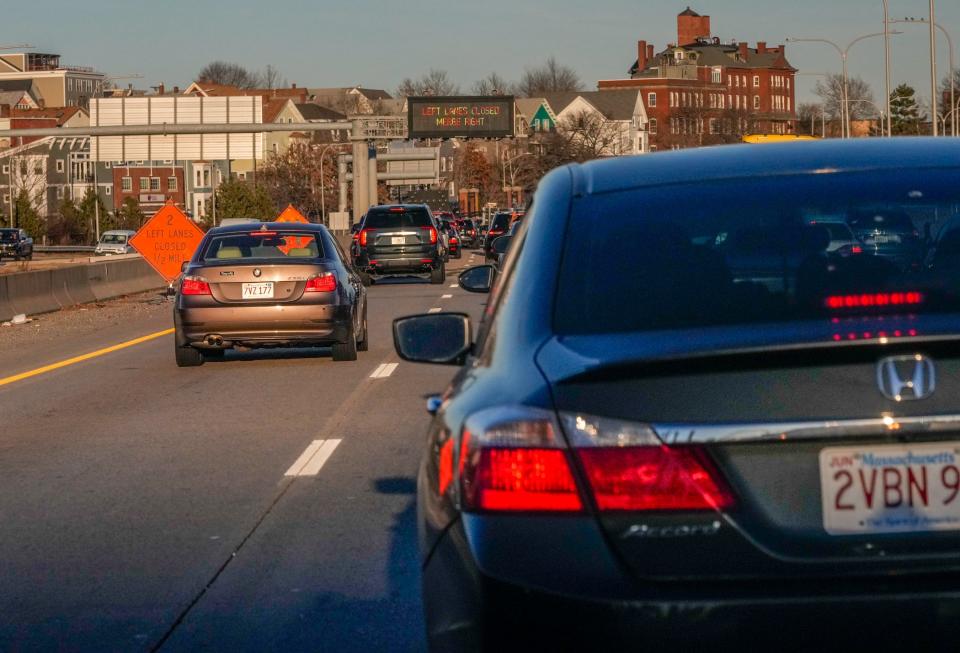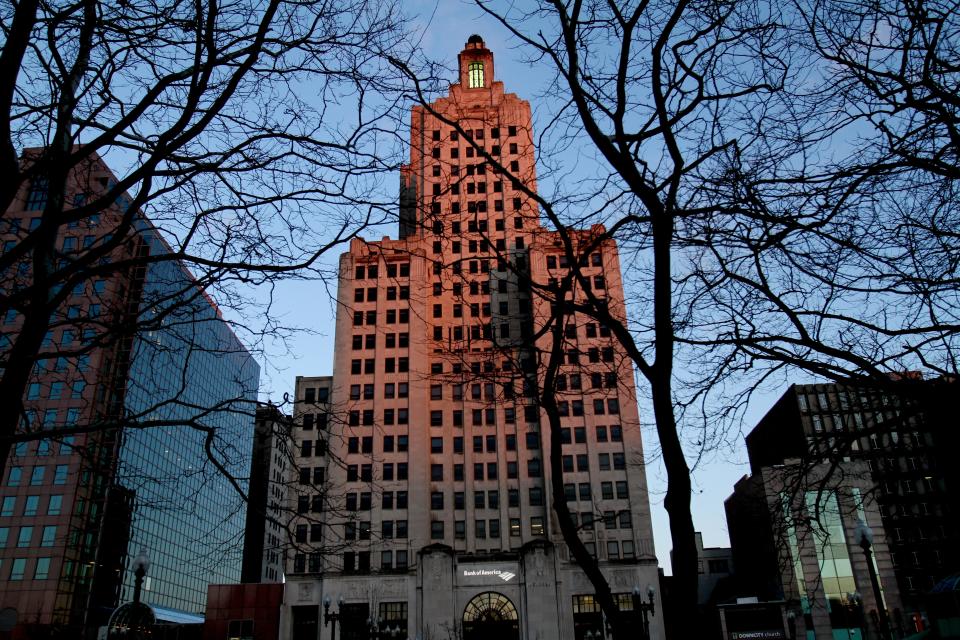From Superman to granny flats and RIPTA: Everything to know about the RI Senate priorities
- Oops!Something went wrong.Please try again later.
PROVIDENCE – Don't expect the Rhode Island Senate to budge next year on an assault weapons ban, a smoking ban at the casinos or House Speaker's K. Joseph Shekarchi's big push for legislation to allow homeowners to build "granny flats" onto their homes to help ease the housing crisis.
In a wide-ranging interview Monday on next year's General Assembly session, Senate leaders also poured cold water on a past priority: free lunch for all students in Rhode Island schools, regardless of their family income, at a projected cost of $20 million to $30 million a year.
And don't expect the leadership team of Senate President Dominick Ruggerio and Senate Majority Leader Ryan Pearson to launch oversight hearings anytime soon into the Washington Bridge fiasco that tied the state into knots last week.
But Senate leaders are heading into the 2024 legislative session that starts in two weeks with plans to give both the Providence school system and RIPTA, the statewide bus system, the kick in the pants they feel they need to deal with their looming money problems without a state bailout.
![Senate President Dominick Ruggerio heads down a staircase in the State House. [David DelPoio/The Providence Journal]](https://s.yimg.com/ny/api/res/1.2/yo63OpeujYiJYlhxap_ZyA--/YXBwaWQ9aGlnaGxhbmRlcjt3PTk2MDtoPTY0MA--/https://media.zenfs.com/en/the-providence-journal/5d102fca52be4646d8591ace25084b0f)
They are also intent on passing legislation to double from six weeks to 12 the interval that the state's "temporary caregivers program" will pay for an employee to take time off to tend to a newborn or ailing relative. And they want to free cities and towns from the need for legislative approval to give their homeowners a property-tax break.
And it became increasingly evident that Pearson's growing influence over policy-making may remove obstacles to some other long-standing proposals that perpetually die in the Senate. Among them: the passage of a safe firearms-storage requirement.
Pearson called safe gun storage – in the wake of multiple potentially avoidable tragedies in Rhode Island and beyond – a "personal priority."
That, in turn, led Senate President Dominick Ruggerio to say publicly, maybe for the first time: "I'm very open-minded on that particular issue."
They agreed more than they disagreed.
What will be the RI Senate's priorities this session?
Ruggerio is confident that 2024 will be the year the General Assembly finally passes a long-debated rewrite of the state's Law Enforcement Officers' Bill of Rights, which has frustrated police chiefs attempting to discipline – and in extreme cases fire – badly behaved police officers.
On this year's "big priority" – pumping hundreds of millions of dollars into housing production – Ruggerio said he sees 2024 as a year to step back and try to figure out why the money isn't being spent faster.
"We provided over $300 million for housing. I want to see ... how that money has been dispensed," Ruggerio said. "I expected that money would have been spent before the winter came, and that really hasn't happened."
"We are going to take a look and see how much money is obligated, where the money is going to be used, and we'll go forward from there," he continued. "I think I don't want to say it's been a little slow coming out of the gate, but it has."
![Senate President Dominick Ruggerio, left, and Majority Leader Ryan Pearson. [David DelPoio/Providence Journal, file]](https://s.yimg.com/ny/api/res/1.2/1poaR2wR1f787iFIL.XJQQ--/YXBwaWQ9aGlnaGxhbmRlcjt3PTk2MDtoPTY0MA--/https://media.zenfs.com/en/the-providence-journal/dfe83c2d50b120b30f7fd666c7a17113)
What will be done about the Washington Bridge fiasco?
The gridlock and traffic chaos that followed the abrupt closing of Interstate 195 West at the Washington Bridge last week hasn’t shaken Ruggerio’s confidence in the state Department of Transportation or its director, Peter Alviti Jr.
“I've been in construction almost 50 years. I've worked on roads. I know how quickly they can deteriorate,” Ruggerio said. “I'm not surprised what happened over there. Even if it was inspected in July, something could happen where that bridge could be damaged extensively. Fortunately, no one got hurt."
Ruggerio said he isn’t opposed to holding legislative oversight hearings per se, but thinks lawmakers should let investigators with the Federal Highway Administration take the lead.
“I'm not saying I have no questions about that,” he said. “What's going to happen, from what I understand right now, is that the Federal Highway Administration is going to come in here. They're going to take a look at ... what happened with this bridge. And once we find that out, then we can move forward and question how this came about.”
Ruggerio and Alviti have a long relationship going back to when they worked for the Laborers' International Union of North America, and Ruggerio said he remains a “fan” of the DOT director.

While Senate leaders support the job the McKee administration is doing on the bridge, they were more critical, particularly Pearson, of DOT Chief of Staff John Igliozzi’s decision to go through with a political fundraiser Tuesday night while bridge traffic was at its worst. Gov. Dan McKee attended the fundraiser.
“No and no,” Pearson said when asked whether the fundraiser should have happened and whether McKee should have attended. “I think you have an emergency on your hands, and if it's an all-hands-on deck moment ... I don't think you have time for fundraisers.”
Ruggerio said he was invited to the fundraiser but didn’t go because he wants to stay neutral in the 2026 campaign for attorney general that Igliozzi is expected to pursue, along with at least one prominent state senator, Dawn Euer.
What about the future of RIPTA?
The bridge closing is one of two major ongoing Rhode Island transportation policy debates, the other being how to plug a looming budget hole of between $20 million to $30 million at the Rhode Island Public Transit Authority.
As it happens, Alviti, chairman of the RIPTA board, and Ruggerio have been at the center of the RIPTA debate because of their criticism of the system's management.
Ruggerio on Monday said he won't commit to providing more money for RIPTA until the quasi-state agency gets new management and becomes “more efficient.”
“We need someone who is well-versed in transit in this state, and there's no one that works for RIPTA right now, to the best of my knowledge, that has those abilities,” Ruggerio said. “I think they can run more efficiently than they run.”
Ruggerio doesn’t have specific ideas on how RIPTA can cut costs while at the same time providing more buses more frequently and boosting ridership. He blames RIPTA management partly for that by not providing his staff with all the information it needs.
He called for the replacement of RIPTA CEO Scott Avedisian at the start of the year.
“I'm not a transit expert and neither is seemingly anybody over there,” Pearson said. “But we specifically, consistently asked them to use those funds in ways that would've been investments in the system that could otherwise change their operating model and make them more efficient. Even just attracting more riders would've been one way to do that.”
And the new bus hub?
While RIPTA begs lawmakers for money to pay its drivers, Ruggerio backs McKee's plan to build a new central bus hub on reclaimed highway land near Interstate 195.
State officials have been working for years to move the current bus hub from Kennedy Plaza in order to beautify that area, but plans to build new hubs at the train station and on Dorrance Street collapsed.
Why bring bus riders farther from the city center, the train station and most downtown destinations than they are now?
More: Shekarchi: 'We need to learn to live within our own state budget'
“I think that's where most of the people who use public transit are located,” Ruggerio said of the former highway site.
Pressed on what exactly the I-195 land site is more convenient to, Ruggerio mentioned the Crossroads RI homeless shelter.
“I don't think it's a disadvantage,” he said of the location. “If you look at what's happening now in the city, a lot of people are working remotely ... A lot of the real estate is vacant in the city, so it's a different city now.”
What's to be done about Providence Public Schools?
Neither Senate leader took a position on when the state takeover of the Providence schools should end, but Pearson said the state cannot keep putting "Band-Aids" on the school system's big financial problem.
"You know the number-one issue with the Providence schools?" he asked rhetorically. "Student loss."
The General Assembly-approved state budget for this year included more than $19.9 million in state "transition fund" dollars for the thousands of now-empty seats of students who left the state's conventional public schools – and Providence's, in particular – for charter schools and other alternatives.
"How long can we sustain these one-year Band-Aids over student loss?" said Pearson, contending the charters are siphoning off students as predicted, but the conventional public schools are not closing classrooms, laying off teachers or reducing spending in any other way to reflect the student losses.
Pearson said the Senate passed a moratorium on charter-school expansion "to prevent that student loss from happening ... [and] tens of millions of dollars of loss to your school system." But the House would not go along.
Pearson also recalled former Providence Mayor Jorge Elorza assuring the Senate Finance Committee that Providence Public Schools "had a plan. ... To this day, despite many requests, we've never seen that plan. ... The state cannot continue to bail them out. It is not fair to every other community in the state." (Elorza now works for a national pro-charter school group Democrats for Education Reform.)
And the all-consuming issue: Housing, from granny flats to Superman
Asked if the residential conversion of the Industrial Trust tower, known as the Superman Building, needs more state help, Ruggerio said he doesn't know but has heard the owner is looking for new investors to back the project.
“I think some of their investors are not interested in investing in that anymore,” he said. “I think they have to go out and take a look at some new investors.”
But, he added, “I don’t think anyone is interested in tearing it down at this point.”
Bill Fischer, spokesman for building owner High Rock Westminster, wrote in an email that "High Rock and its investors remain committed to the restoration of 111 Westminster [the Industrial Trust tower]. The [interior] demolition work continues unabated, as it has since the beginning of November."

For two years running, the Senate has declined to pass legislation making it easier for homeowners to build accessory apartments, or “granny flats.” The issue has become a top priority of House Speaker K. Joseph Shekarchi.
“The Senate will pass it if everyone's on board, all the stakeholders,” Ruggerio said about the accessory apartment bill, also a priority of AARP.
On what specific concerns senators are looking to address, Pearson said “units being built up right to my fence line,” and the size of structures being built, like one on East Providence Mayor Roberto DaSilva’s house.
“I think there's a path forward on this one to get something that allows this use, but I think it needs to be well confined and restricted enough,” Pearson said.
On whether Rhode Island should build a new state archives and museum across the street from the State House, something backed by Secretary of State Gregg Amore, Ruggerio said he supports it in concept.
“I think we want to see how it fits into a broader Capitol Hill plan that is something that works for the next 20, 30, 50 years, rather than just add one more building to this complex,” he said.
This article originally appeared on The Providence Journal: RI Senate leadership outlines priorities, from RIPTA to housing

